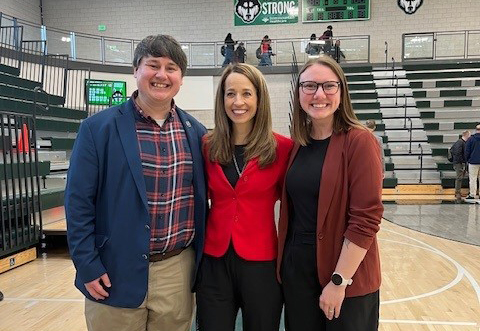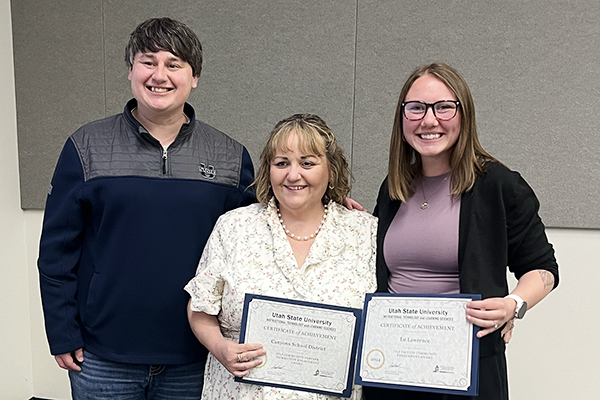CEHS Researchers Collaborate With Canyons School District to Impact Youth With Disabilities

Project UNITE workshop with general education teachers, special education teachers, and school counselors from Canyons School District
Stephen Kwiatek, assistant professor in the Department of Special Education and Rehabilitation Counseling (SPERC), and Lu Lawrence, assistant professor in the Department of Instructional Technology and Learning Services (ITLS), both departments housed in the Emma Eccles Jones College of Education and Human Sciences, have entered a unique research partnership with Canyons School District, located in Sandy, Utah, as part of a collaborative effort to impact the lives of young adults with disabilities who are transitioning from the district’s high schools to other programs for young adults.
“Empowering students with disabilities with the knowledge and skills they will need to make employment and other life choices is the goal of every special educator,” says Tom Higbee, professor and department head of SPERC. “The importance of the work Drs. Kwiatek and Lawrence are doing to empower both teachers and students cannot be overstated.”
Preparing disabled students for adult life has been the focus of Kwiatek’s academic pursuits throughout his career. After earning a degree in teacher education from Illinois State University, Kwiatek taught high school in rural and urban Illinois to students with disabilities. In conjunction with that work, he also ran the school district’s work program, which was designed to help students connect with the community for employment experiences. “As a part of the transition process, we prepared students for education/training, employment, and independent living,” explains Kwiatek. “By working with students, their families, and the community, I learned the importance of preparing students for adult life.”
Kwiatek believes it is critical that educators and counselors are equipped to do what’s best for students—and that often means doing more than the law requires. “Legally, we are required to meet once a year to write goals with the students,” he says. Although he learned a lot from these meetings about what a student wants for his or her future, without asking the right questions and knowing the student on a more personal level, it was easy to miss the solutions. “Doing what’s right for the student is figuring out the why. We only have a student for such a short amount of time, not acting on that information would be a disservice to the student. We need to be sure we listen to learn and not to respond.”
Kwiatek completed his doctoral work at UNC Charlotte and a post-doctorate at the University of Illinois where he focused on transition work for special needs students. He joined SPERC at USU in 2022. In the summer of 2023, the seeds of a collaborative research partnership with Canyons were planted when Kwiatek met Linda Hall at a post-secondary transition conference in Provo, Utah. Hall is principal of the post-high school, Life Skills Academy, in Sandy, Utah, where disabled students in the district receive additional schooling up to the age of 22 to help them become better prepared for adulthood.

Kwiatek and Lawrence with Utah’s First Lady, Abby Cox, at a Canyons Unified Sports event
Hall wears many other hats relative to serving students with disabilities. She is a district administrator at Canyons School District, the program administrator for Secondary and Transition in Special Education, and she heads up the district’s efforts with Unified Sports. Kwiatek’s relationship with Hall led to introductions with significant Utahns who support these initiatives, including USU alumna and First Lady, Abby Cox, who has taken an active part in promoting Unified Sports throughout Utah.
Hall is passionate about helping students with disabilities achieve the best possible start to adult life. “Linda and I spoke about how we might work with teachers, how we might implement best practices, and how we might collaborate with the community,” recalls Kwiatek. “We discovered that we have this shared interest in finding ways to leverage the expertise of general education teachers, special education teachers, and school counselors to prepare disabled students for the lives they want to live.”

Kwiatek, Hall, and Lawrence at an ITLS Awards Night
Kwiatek then reached out to Lawrence, whose expertise in collaboration and research design is a perfect complement to the needs of the new collaborative effort with Canyons that Kwiatek and Hall wanted to create. The researchers formed a Research Practice Partnership (RPP) called Project UNITE, short for Unified Networks in Transition Education. “A big aspect of a Research Practice Partnership is long-term collaboration,” says Lawrence. “We oversee together, research together, design and test together, analyze data together—it’s highly collaborative from start to finish.”
Although Project UNITE is research-based and Kwiatek and Lawrence will submit their findings in numerous papers throughout the duration of the partnership, the RPP is, by its nature, designed to benefit the participants. “Not only do we get research out of this,” says Kwiatek, “but we will also support on-the-ground change to better support the educators and staff at Canyons. We’re designing research with people, not for people.”
“The ‘what’ in the research is still unknown,” explains Lawrence. “This is backward from other research models where we come in and say, ‘We’re doing this specific thing, and this is what it looks like.’ Instead, we’re trying to understand together what we need to develop.”
For the past year, a voluntary group of general education teachers, special education teachers, and school counselors representing the five high schools in the Canyons District and the post-high school have met regularly with Kwiatek and Lawrence. “We want to work with them and learn with them,” says Kwiatek. “This is not just another research project. It’s about developing something together that’s meaningful.”
The group is currently identifying and addressing barriers. “We’re unpacking some of the difficulties of the reality of what the job requires and what constraints are built in,” says Kwiatek.
“We plan to get all the way down to how teachers interact with students, and how students feel supported so they’re walking out after graduation with a goal and they’re able to be successful,” says Lawrence. “In the next few years, we will get to a place where we can say that we’re developing an app, or user-friendly policy documentation, or collaboration tools. It could be anything.”
The RPP was recently awarded a USU Research Catalyst Grant, which is internal seed money that will be used as bridge funding while Kwiatek and Lawrence seek further grants to support the project. The researchers are hopeful that they can continue their collaborative research with Canyons for the long term. Says Kwiatek, “I can’t think of a better way to be situated than leveraging the expertise of the educators and counselors at Canyons—the people who work with students day in and day out.

